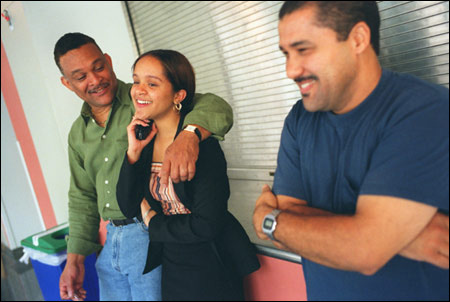Project Success scholars aim for future:
HMS outreach program targets Boston, Cambridge students

The presentations in the Harvard Medical School lecture hall were devoted to Staphylococcus aureus, antibodies and antigens, cholesterol, cloning, and cancer, none of which were unusual subjects for a medical school campus.
What was unusual that summer Friday (Aug. 22) were the presenters: high school students from Boston and Cambridge. The students were wrapping up an intensive eight-week paid internship that had them conducting hands-on research side by side with Harvard Medical School faculty.
The program, called Project Success: Opening the Door to Biomedical Careers, is in its 11th year and is aimed toward disadvantaged students in Cambridge and Boston high schools, though some students can return after they’ve entered college. Project Success is designed to give the students an in-depth, hands-on experience and is funded by a variety donors.
The program, which hosted 19 youths this summer, aims to provide long-term mentoring for students interested in science, according to HMS Dean for Diversity and Community Partnership Joan Reede. Students interested in repeating the experience are welcomed back year after year, Reede said, in hopes the in-depth program will have a deeper impact than merely giving the youths a taste of college science.
“There’s no reason to think that this one, eight-week experience is enough,” Reede said. “If students are talented, keep their grades up, and are committed, we’ve made a commitment to nurture them.”
By returning summer after summer, the students begin to build their own community, a community whose resources they can draw on as they grow older, enter college, and begin to build professional networks.
“A part of mentoring is bringing the kids back so students end up building their own community of support,” Reede said.
If the academic progress of its alumni is any measure, the program has been successful. Ninety percent of participants have graduated from high school, and 99 percent of those have gone on to college, including Harvard, M.I.T., Tufts, Brown, Princeton, and Stanford.
“We have them at the Medical School, the Dental School, at the teaching hospitals, teaching at public schools, doing the things we’d hoped,” Reede said.
This year’s class included a range of students, including seven who are entering their junior year in high school this year, five entering their senior year, five who’ve graduated and are entering college, and two returning college students.
Boston English High School student Greidy Terrero, in her junior year this year, called the experience “wonderful.” Terrero, whose mother and uncle work as custodians at Harvard, received the Biomedical Science Careers Program’s John R. Moore Scholarship Award for her dedication and commitment to succeed in science.
Terrero said that she really didn’t know what to expect when she began the program. She said she’d been interested in becoming a pharmacist one day, but she’s now more interested in drug research.
Terrero worked on Staphylococcus aureus in the lab of Jean Lee, associate professor of medicine. Lee, who has taken on Project Success interns for eight or nine of the past summers, said the experience exposes students to laboratory work far beyond what they’d get in high school. The experience isn’t just a free ride, either, Lee said. At the end of the summer, each participant has to write a paper and give a presentation about his or her research. By that time, she said, they’ve all come a long way.
“They’re all bright and enthusiastic,” Lee said. “They don’t even know what a pipette is when they walk in the lab.”
The benefits extend past the summer and to their regular schools, according to Toby Romer, an assistant principal at English High School. Romer said the experience is not just extremely valuable for students like Terrero, it also touches her classmates when she returns to her high school science classes and shares what she learned.
“It’s a great resource to the school,” Romer said. “They return in the fall with perspective. They contribute to their science classes. They raise the bar and set an example for other students. A school community is only as strong as its students.”




